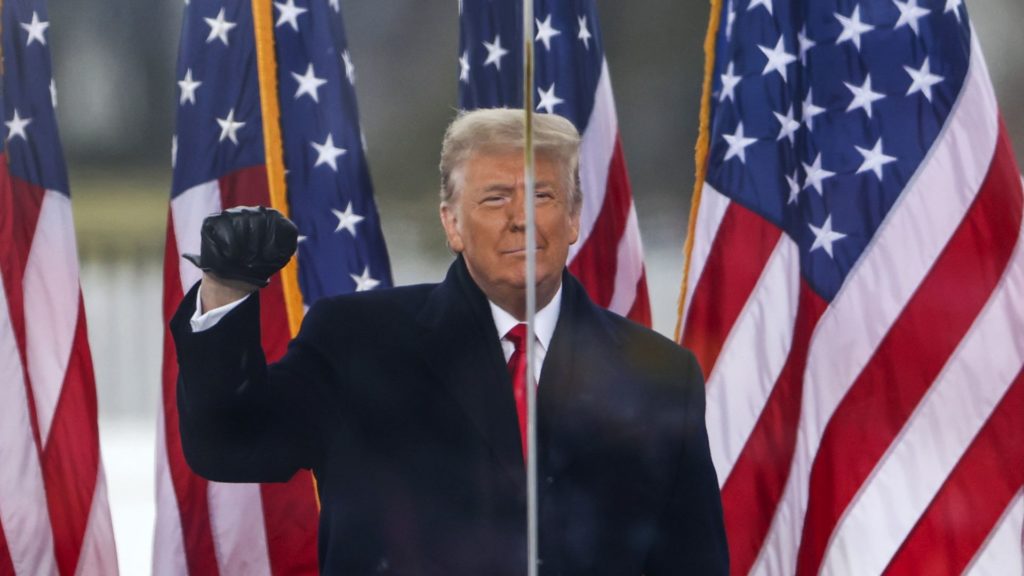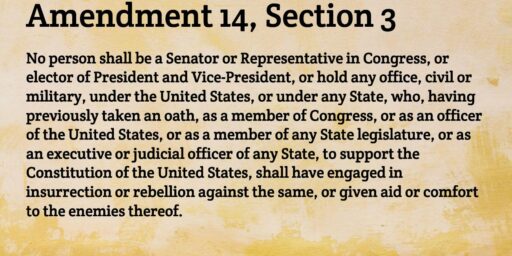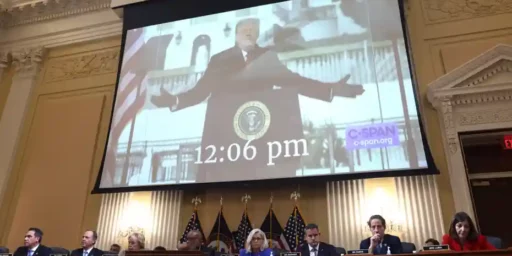The Maine Ruling
A compelling document.

So, in an attempt to make sure I understand this situation as thoroughly as possible, I read the ruling as issued by Maine’s Secretary of State, Shenna Bellow.
Here is the legal justification for the process:
Under Section 443 of Title 21-A, the Secretary of State is responsible for preparing ballots for a presidential primary election. The Secretary must “determine if a petition meets the requirements of,” as relevant here, Section 336 of Title 21-A, “subject to challenge and appeal undersection 337.” 21-A MRS. § 443.
You can go directly to section 337 of the Maine code here.
Also,
As a general matter, states have inherent authority over their ballots. Consistent with state authority to regulate the “Times, Places and Manner” of congressional elections under Article I, Section 4 of the U.S. Constitution, and to manage the selection process for presidential electors, see US. Const. art. I, § 1 (“Each State shall appoint, in such Manner as the Legislature thereof may direct, a Number of Electors …. “); McPherson v. Blacker, 146 U.S. 1, 35 (1892 (“(The appointment and mode of appointment of electors belong exclusively to the states under the constitution of the United States.”), “the States have evolved comprehensive .. . election codes regulating… .. [the] selection and qualification of candidates.” Storer v. Brown, 415 U.S. 724, 730 (1974).
[…many more citations…]
It is that authority that the Maine Legislature has delegated to me.
[…]
The State’s authority, and that delegated by the Legislature, require me to limit access 2 to the primary ballot to qualified candidates
As such, just like in Colorado, the proper procedure was followed under the law, and due process was afforded to candidate Trump. This counters my own ill-informed notion, which I think I expressed in the comments to other posts, that the ME process was bureaucratic fiat–it clearly was not and was fully in keeping with Maine’s laws and the broader constitutional role afforded to states in these processes.
I would note that eligibility to be on the ballot is a procedural matter and this process fits.
The problem isn’t the process. The problem is what Trump did while it office. It is not at all unreasonable for Maine’s Secretary of State to have interpreted section 3 of the 14th Amendment as she did. And it is within the rights of candidate Trump to appeal the ruling. And yes, it makes sense to adjudicate the matter before SCOTUS.
I will add, that the more I read and think about this, the more I think that Trump should be disqualified under section 3 and that his constitutional remedy is a vote in Congress, as per the plain text of the 14th Amendment (but I also continue to think that SCOTUS will rule in Trump’s favor).
For what it is worth, the Maine SoS used the January 6th Committee report as the main basis for determining Trump’s insurrectionist behavior.
In reading the ruling, I am struck that Trump’s objections are not that he did not engage in insurrection, but various due process and bias arguments. Indeed, the ruling notes “The parties do not meaningfully dispute the events of January 6, 2021” and yet, Trump’s best defense here is that he didn’t engage in insurrection. And, as Secretary Bellow notes in her ruling, that should be a defense Trump is prepared to make, given that this is hardly the first time that charge has been leveled. Clearly under section 3 if he didn’t engage in insurrection, he is qualified to run. So he should mount that defense if he can.
The only other defense entered was one based on First Amendment free speech rights, which is answered in the ruling as follows:
The events of January 6, 2021 notwithstanding, Mr. Trump also claims that he cannot be disqualified from the presidency for his conduct because his public statements and speeches are protected by the First Amendment. But Mr. Trump cites no precedent—and I am unaware of ‘any—that permits the First Amendment to override a qualification for public office. Section Three of the Fourteenth Amendment is not a criminal penalty, as in Federal Election Commission v. Wisconsin Right 10 Life, Inc., 551 U.S. 449, 468-69 (2007), nor is it a punishment, cf. Dec. 15, 2023 Hearing 5:24:08-5:24:30 (Magliocea) (describing historical understanding of Section Three). It is simply a qualification for office.‘
Additionally, because I conclude that Mr. Trump intended to incite lawless action, his speech is unprotected by the First Amendment.
The ruling does a very good job of outlining the events of January 6th, and details why they were an insurrection and Trump’s role in those events.
It will be interesting to see how SCOTUS addresses the reasoning therein.





This is also the case with his attorney’s filings to the DC Circuit court (and are at the heart of the response Jack Smith’s team filed last night).
Time will tell as to whether or not the “Col. Nathan R. Jessep defense strategy” works better in a real court than it did in “A Few Good Men.”
Since arguably the reason we’re in the mess is because the Senate wasn’t willing to convict Trump after January 6th, for various ridiculous reasons, part of me feels that it would be very appropriate for the Supreme Court to hand the issue back to Congress to deal with, but if we think things are dysfunctional in Congress now now, imagine what happens then? But then again, maybe that’s what’s needed.
How much of the country is willing to put up with a government shut down for how long, for example? Which would absolutely suck for the government employees in question, of course. There’d be no chance of Ukraine funding happening. I can’t imagine what it would take for enough Democrats to vote to allow Trump to be eligible for the Presidency again, so maybe, eventually, the sane Republicans (I know, I know) would actually leave the party or at least cross party leadership to allow the Federal government to function?
But I do keep coming back to the fact that, legally, Trump shouldn’t be eligible to run. Just like the nut from the Young Turks can’t be President either, rightly or wrongly.
And if Trump does run, and wins, the amount of litigation that will happen at that point will be astounding. I can see wanting to let him run so he can (I hope) loose again, but there’s a non-zero chance that won’t happen, and I don’t think that’s a risk we should take.
And we go back to the basic problem that we have, which is that every time Trump (probably) could have been stopped, almost no one was willing to bear the political cost of doing so. And those few who were were usually too late, or certainly, not numerous enough.
Yes, his fans and enablers employ these sorts of arguments for all of his blatantly outrageous behavior. They don’t care that it’s outrageous, especially looked at in totality; they just want to find some technicality to excuse each issue and move on to the next.
@Kevin:
Atrios occasionally enveighs against “centrist dipshits”. I think that encapsulates a lot of what’s wrong. This is the third time establishment Republicans have been handed a chance to get rid of Trump, but they’re too gutless to do it. They spent decades creating the Frankenstein Repblican base, and now they’re terrified of crossing it. And way to many Ds are also afraid to rock the boat. Centrist dipshits.
@Kevin:
Rightly, I would say. If you name your podcast after the folks responsible for the Armenian genocide, you should have to spend the rest of your life either apologizing or ostracized.
We might forgive Rod Stewart for just being dumb and ignorant naming a song “Young Turks”, but Cenk Uyghur was born in Turkey, is interested in political things, and almost certainly knew better, and by now absolutely must. Any time he scurries over somewhere and tries to pundit somewhere the host should ask “what the fuck is wrong with you?”
I have a general, anti-genocide political stance. As a rule of thumb, I’m opposed.
Anyway, I hate that guy. I know nothing about the Armenians, but I hate that guy.
@gVOR10:
100% to this. It has been a failure of one party to police it’s own.
Which gets to a flaw in our system design.
If you think that keeping Donald L. Trump off of the ballot in a few states is a good thing, you do not understand the real strategy in 2021. The false electors were never going to be counted, but they would cause enough confusion and delay in the vote to throw the election into the House. If the election goes to the house, DLT wins. Each state gets one vote for president in the house regardless of population, and there are more republican states. The 14th amendment exclusion is ready made conflict and will lead to the election being thrown to house. If Biden does not get enough electors without those states, DLT wins. Rep. Thomas Massie (R-Ky.) has already pointed at this: https://news.yahoo.com/gop-rep-warns-house-final-213514991.html.
The Supremes have to decide nothing less than the question of whether we are a nation of laws. If POTUS is above the law, we have no law, just power and privilege. It would effectively reverse Marbury, rendering the Judiciary branch irrelevant and powerless. For this reason, and this reason alone, I think even the true MAGA whores like Thomas and Alito might hesitate. I cannot imagine Roberts signing on, which means we probably start with four not five justices.
@RWB:
If you want a revolution, try electing a POTUS against the popular vote and with the legislatures of non-states like Wyoming and North Dakota making the call. A POTUS chosen by depopulated red states will have a very hard time governing and would be driven to overt authoritarianism. At very least we’d get calls for a constitutional convention, and MAGAts might want to bear in mind that discarding the Constitution means the 2d Amendment goes, too.
‘They’ may have more states, but we have the people, the money and the youth.
@Kevin:
This! And it again reminds me of a quote, attributed to von Clausewitz I think, …someplace never becoming a great nation…people get the government they deserve. There’s a lesson there someplace but my swiftly declining cracker intellect can no longer connect the dots. 🙁
@mattbernius:
Indeed. There have been cases, IIRC, in multi-party regimes of the left and center parties temporarily setting aside conflicts and cooperating, even jointly backing single candidates, to freeze out the far right. With our winner-take-all, inherently two party system, there are no center and center right parties for Dems to cooperate with. It’s the binary parties with no option of coalition shifting.
@Michael Reynolds: I’ve been giving some thought to this, and I’m inclined to think the loyalty of the conservative Justices may not be to Trump. Their loyalty is clearly to the hard right and that would be served just as well if not better by a Haley or DeSantis administration. I wouldn’t be surprised if they would welcome the opportunity to rule against Trump and give themselves apparent legitimacy as well as being relieved of the taint of Trump.
If the Supes side with Coloradomand Maine I don’t see how Trump can be on the ballot in any state
@RWB: I’d disagree. If the Supreme Court doesn’t rule that Trump should be on the ballot, he also isn’t eligible to be President, full stop. Unless the House of Representatives can find 2/3s of the members of the House and Senate to allow Trump to do so, he can’t be president. Doesn’t matter who the House votes for.
@Gustopher: I didn’t mean him in particular, just that I’m not sure that excluding non-natural born citizens in general serves us well, nor is it even clear what it means. It was meant to prevet a foreign king from being elected President, from what I remember; I don’t think that’s a risk today. But, then again, Boaty McBoatface.
The problem with this “constitutional remedy” at this stage of the election cycle is that it has to be invoked long before the general election campaign proper even starts if it is to have any practical effect. The 14th amendment was passed long before primaries were introduced; I imagine legislators in the 1860s would have been astonished to see courts asked to rule a year before the electoral college met that someone was disqualified from being elected who couldn’t even be nominated for office until next August.
That’s why I believe the Supreme Court will find a way to avoid ruling on Trump’s eligibility in the current cases and allow him to appear on primary ballots. Plenty of time for events in 2024 to provide greater certainty on some of the most important issues the court would have to consider (first and foremost, whether Trump will even be contesting the presidential election).
Yes. Yes, it absolutely is. Insurrection is a crime. It is defined under the law. You do not get to punish someone for a crime that they have neither been charged with nor convicted of.
This fool in Maine taking Trump off the ballot because he’s an insurrectionist is exactly the same as if a Republican Secretary of State had taken Barack Obama off the ballot because he wasn’t a U.S. citizen. You don’t get to do things like that based on the OPINION of elected partisans.
Is being a white male in academia THAT terrifying that Steven L. Taylor has to descend to these intellectual depths to try and stay on the good side of the mob?
@TheRyGuy:
One of the more disheartening things is seeing someone whose convinced that we, as writers, are choosing our opinions because someone is either paying us or we’re trying to please someone.
What’s especially ironic are that the people who tend to make these accusations are the people who regularly regurgitate the most banal conservative media complex takes on things–you know, an industry with a long track record of doing exactly what they are accusing us of.
Also weird race obsession to boot.